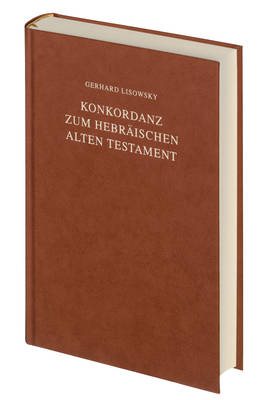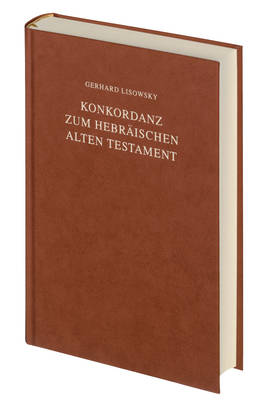
- Afhalen na 1 uur in een winkel met voorraad
- Gratis thuislevering in België vanaf € 30
- Ruim aanbod met 7 miljoen producten
- Afhalen na 1 uur in een winkel met voorraad
- Gratis thuislevering in België vanaf € 30
- Ruim aanbod met 7 miljoen producten
Zoeken
Konkordanz Zum Hebraischen Alten Testament [Concordance to the Hebrew Old Testament] (Hebrew, German, and English Edition)
Composed and Written by Hand on the Basis of the Masoretic Text Prepared by Paul Kahle and Rudolf Kit
Gerhard Lisowksy
€ 145,45
+ 290 punten
Omschrijving
This third revised edition, prepared by Hans Peter Ruger, is an updated reprint of Gerhard Lisowsky's Concordance and retains the author's clear Hebrew calligraphy and the book's original, larger format.
The Concordance to the Hebrew Old Testament (Konkordanz Zum Hebraischen Alten Testament) includes a complete list of all Hebrew and Aramaic vocabulary in the Hebrew Old Testament, including the proper names. It was compiled on the basis of the third edition of Kittel's Biblia Hebraica, which rendered the Hebrew text of the Leningrad Codex. Since the Leningrad Codex remains the base text in subsequent editions of the Biblia Hebraica (BHL, BHS, and even the most recent BHQ), the Concordance can be used together with them without any difficulty.
Each word form is presented with a brief and vocalized extract from the biblical text for context. References to verbs are subdivided into the root's various stems and the subject of each finite verb form is indicated by reference to the apparatus at the foot of the page, indicating systematically what subjects are used with any particular verb. Nouns are grouped according to the role it plays in a sentence--subject, object, or neither--and for subjects and objects, the relevant verb is provided. While full references are not provided for words lacking significant content (mainly prepositions, particles, interjections, and numerals), every word does have a German, English, and classical Latin (not Vulgate) definition.
The Concordance to the Hebrew Old Testament (Konkordanz Zum Hebraischen Alten Testament) includes a complete list of all Hebrew and Aramaic vocabulary in the Hebrew Old Testament, including the proper names. It was compiled on the basis of the third edition of Kittel's Biblia Hebraica, which rendered the Hebrew text of the Leningrad Codex. Since the Leningrad Codex remains the base text in subsequent editions of the Biblia Hebraica (BHL, BHS, and even the most recent BHQ), the Concordance can be used together with them without any difficulty.
Each word form is presented with a brief and vocalized extract from the biblical text for context. References to verbs are subdivided into the root's various stems and the subject of each finite verb form is indicated by reference to the apparatus at the foot of the page, indicating systematically what subjects are used with any particular verb. Nouns are grouped according to the role it plays in a sentence--subject, object, or neither--and for subjects and objects, the relevant verb is provided. While full references are not provided for words lacking significant content (mainly prepositions, particles, interjections, and numerals), every word does have a German, English, and classical Latin (not Vulgate) definition.
Specificaties
Betrokkenen
- Auteur(s):
- Uitgeverij:
Inhoud
- Aantal bladzijden:
- 1696
- Taal:
- Engels
- Reeks:
Eigenschappen
- Productcode (EAN):
- 9781598565225
- Verschijningsdatum:
- 15/04/2010
- Uitvoering:
- Hardcover
- Formaat:
- Genaaid
- Afmetingen:
- 165 mm x 241 mm
- Gewicht:
- 1397 g

Alleen bij Standaard Boekhandel
+ 290 punten op je klantenkaart van Standaard Boekhandel
Beoordelingen
We publiceren alleen reviews die voldoen aan de voorwaarden voor reviews. Bekijk onze voorwaarden voor reviews.











